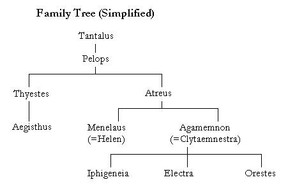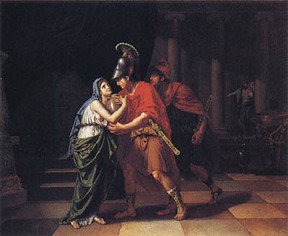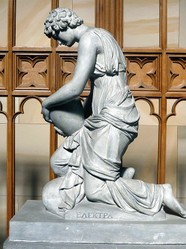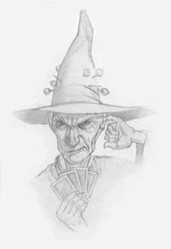The play begins several years later. Now an adult, Orestes returns to Mycenae and plans revenge against his mother and step-father.
 Accompanied by Pylades, who is the son of Strophius, and a pedagogue (teacher), Orestes asks the pedagogue to go into the city and announce that there has been a horrific chariot accident, in which Orestes was killed.
Accompanied by Pylades, who is the son of Strophius, and a pedagogue (teacher), Orestes asks the pedagogue to go into the city and announce that there has been a horrific chariot accident, in which Orestes was killed.
He adds that two men will be arriving with an urn carrying his remains. In reality, the two men will be Orestes and Pylades.
The audience or reader first encounters Electra as she laments over the death of her father. She is eventually joined in her grief by the chorus (women of Mycenae). She engages in an argument with her sister, Chrysothemis, over her close bond with their mother and Aegisthus.
Then, she confronts Clytemnestra about the murder of her father.
Shortly afterwards, a messenger arrives with the report of Orestes death. Electra is distraught by the news, but Clytemnestra is relieved by her son’s demise. However, Chrysothemis has just been to Agamemnon’s tomb and found offerings lain there.
 She surmises that these must have been left by Orestes and tells Electra that she believes their brother is still alive.
She surmises that these must have been left by Orestes and tells Electra that she believes their brother is still alive.
Electra rejects her sister’s conclusion and, instead, asks her to join her in a plot to kill their step-father, but Chrysothemis refuses to engage in the scheme.
Later, Orestes enters carrying an urn, which supposedly holds his own ashes. Neither twin recognizes the other, but when Orestes notices the great distress Electra displays over the death of her brother, he reveals his true identity to her.
Orestes, with his companion Pylades, then goes into the house and promptly kills Clytemnestra. They place her body under a sheet and present it to Aegisthus as the corpse of Orestes. However, Aegisthus lifts the sheet to discover the lifeless body of his wife, prompting Orestes to reveal himself and his motives.
Aegisthus is then escorted off stage, where he will be killed at the hearth, a fitting revenge, as this was the location of Agamemnon’s death.
However, the play ends before the execution is announced.


 Prior to the Trojan war, Agamemnon sacrifices one of his daughters, Iphigenia, in accordance with the demands of the gods.
Prior to the Trojan war, Agamemnon sacrifices one of his daughters, Iphigenia, in accordance with the demands of the gods. Accompanied by Pylades, who is the son of Strophius, and a pedagogue (teacher), Orestes asks the pedagogue to go into the city and announce that there has been a horrific chariot accident, in which Orestes was killed.
Accompanied by Pylades, who is the son of Strophius, and a pedagogue (teacher), Orestes asks the pedagogue to go into the city and announce that there has been a horrific chariot accident, in which Orestes was killed. She surmises that these must have been left by Orestes and tells Electra that she believes their brother is still alive.
She surmises that these must have been left by Orestes and tells Electra that she believes their brother is still alive.




 How to Avoid College Debton 07/31/2014
How to Avoid College Debton 07/31/2014
 Was Charlotte Bronte Jealous of her Sister Anne?on 07/15/2014
Was Charlotte Bronte Jealous of her Sister Anne?on 07/15/2014
 Whose Side is Cancer Research UK on?on 07/06/2014
Whose Side is Cancer Research UK on?on 07/06/2014
 What is Pyrrhic Substitution in Poetry?on 07/05/2014
What is Pyrrhic Substitution in Poetry?on 07/05/2014



Comments